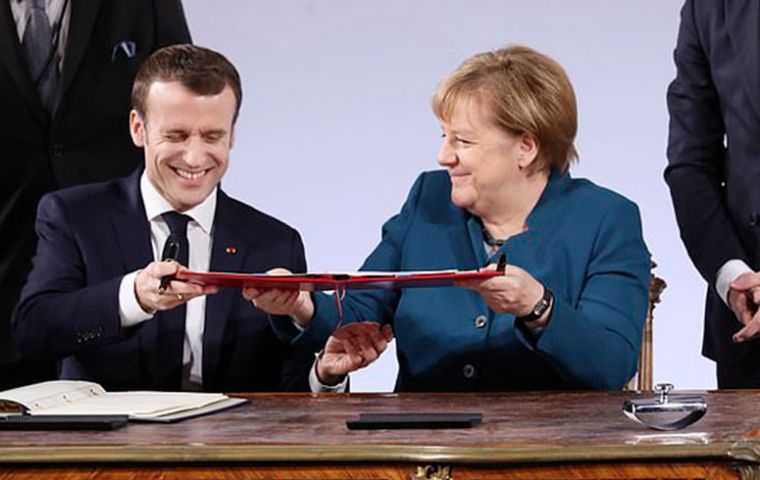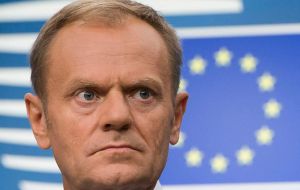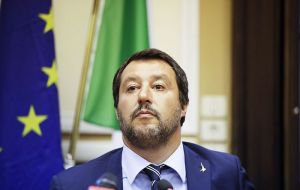MercoPress. South Atlantic News Agency
France and Germany ratify integration process, but not all of Europe is happy
 There is rich symbolism in the signing in the German city of Aachen, which has changed hands over the centuries and is known in French as Aix-la-Chapelle.
There is rich symbolism in the signing in the German city of Aachen, which has changed hands over the centuries and is known in French as Aix-la-Chapelle.  EC president Tusk said Europe needs a clear signal from Paris and Berlin, that strengthened co-operation is not an alternative to the co-operation of all of Europe
EC president Tusk said Europe needs a clear signal from Paris and Berlin, that strengthened co-operation is not an alternative to the co-operation of all of Europe  “It is time to oppose the Franco-German axis with an Italian-Polish axis,” said Italy's right-wing Interior Minister Matteo Salvini on a visit to Poland
“It is time to oppose the Franco-German axis with an Italian-Polish axis,” said Italy's right-wing Interior Minister Matteo Salvini on a visit to Poland France and Germany have signed a new treaty on Tuesday aimed at breathing new life into their place at the centre of the European Union. As the UK moves to leave the EU and a rising tide of populism challenges the core liberal values of the bloc, the new treaty commits wholeheartedly to defending it.
German Chancellor Angela Merkel highlighted peace and security and backed the emergence of a European army. French President Emmanuel Macron said the challenge was for Europe to become “a shield” against the tumults of the world.
There is rich symbolism in the signing in the German city of Aachen, which has changed hands over the centuries and is known in French as Aix-la-Chapelle.
France and Germany agree to establish common positions and issue joint statements on major EU issues - formalizing their existing co-operation. They also plan to act as a joint force at the United Nations.
From foreign policy to internal and external security, the two nations commit to coming up with common positions while seeking to bolster “Europe's capacity to act autonomously”.
The two countries commit to: Deepening economic integration with a Franco-German “economic zone”; Developing Europe's military capabilities, investing together to “fill gaps in capacity, thereby reinforcing” the EU and Nato; The possibility of joint military deployments as well as a Franco-German defense and security council.
For young people, there is agreement to focus on cultural exchanges and increase learning of each other's languages, with the aim of a Franco-German university. There are also plans for closer cross-border links and greater “bilingualism” on both sides of the borders.
German Chancellor Angela Merkel said the treaty came amid “special times” with the rise of populism and nationalism. “For the first time, a country is leaving the European Union - in the form of Great Britain,” she added.
“Those who forget the value of peace and spread lies are accomplices in the crimes of the past,” Mr Macron said. “I would rather look our Europe in the face and strengthen it to protect our peoples. That is what we are doing,” he added.
Mrs Merkel also said Germany wants to “make our contribution to the emergence of a European army.” She added “We are committed to developing a common military culture, a common defense industry and a common line on arms exports”.
The idea is not new - both leaders have called for a common European defense force that would operate within - and not replace - Nato.
Nato's Secretary General, Jens Stoltenberg, gave the treaty his approval, saying Nato had been briefed on the military matters.
“For decades, Franco-German cooperation has been essential for security and stability in Europe,” he said, adding that the treaty was a reminder “of how far Europe has come since the devastation of the Second World War”.
European Council president Donald Tusk - a native of Poland - sounded a note of caution in a speech he gave at the ceremony. “Germany and France can, and should, serve the whole of Europe well,” he said.
But he added: “I will put it bluntly - today Europe needs a clear signal from Paris and from Berlin, that strengthened co-operation in small formats is not an alternative to the co-operation of all of Europe. That it is for integration, and not instead of integration.”
“It is time to oppose the Franco-German axis with an Italian-Polish axis,” said Italy's right-wing Interior Minister Matteo Salvini on the day the final treaty draft was announced.
He was speaking on a visit to Poland, aiming to challenge France and Germany's dominance in the EU with a Euro-skeptic alliance ahead of May elections to the European Parliament.




Top Comments
Disclaimer & comment rules-

Read all comments“Im in charge” says Angela, you are Barney Rubble - “yes Fred!”
Jan 23rd, 2019 - 02:22 pm 0Commenting for this story is now closed.
If you have a Facebook account, become a fan and comment on our Facebook Page!